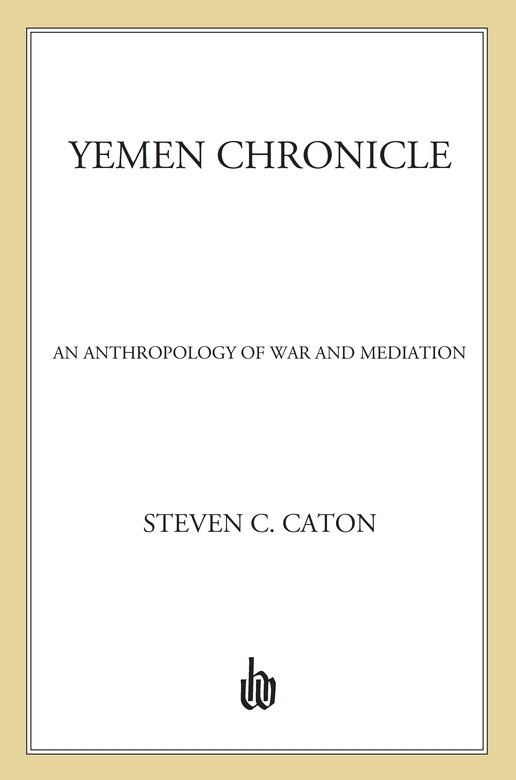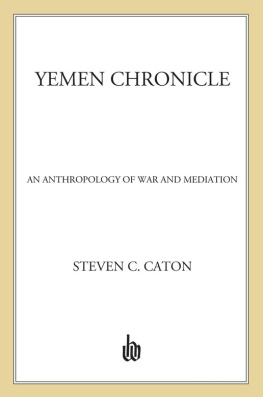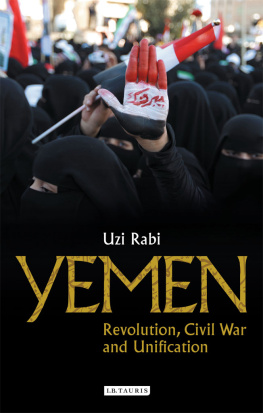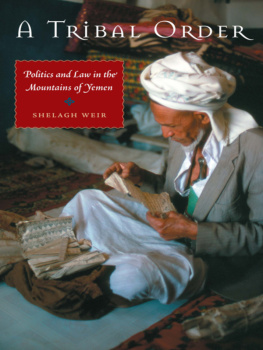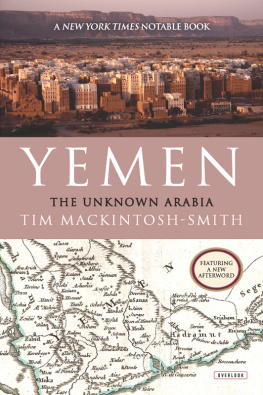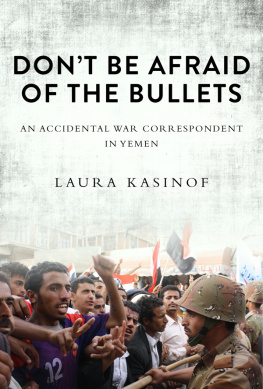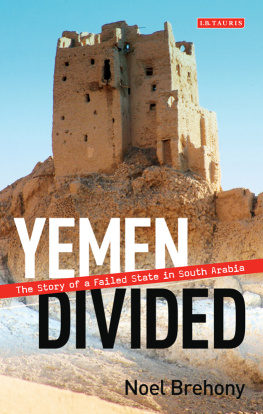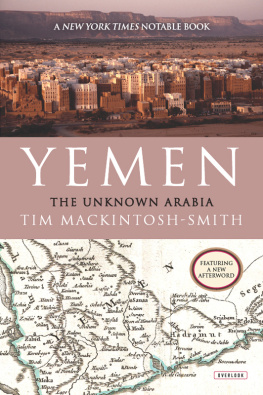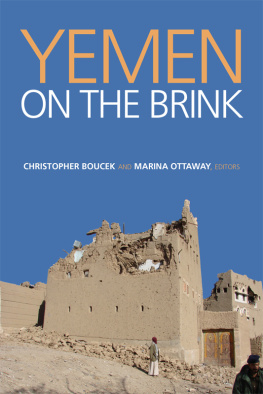I thank the Institute for Advanced Study at Princeton for providing a fellowship in 1998-99, during which time I wrote a major portion of this manuscript. Without Elisabeth Siftons unstinting editorial help, it would never have seen the light of day, however. That our friendship has not only survived but deepened in the process, I count as a miracle and a blessing.
I should have known that I would not get to the bottom of the 1980 events by going back to Khawlan and interviewing people there, but my need for narrative closure overcame my common sense and theoretical judgment. When I left Yemen the first time, the strange events in Khawlan struck me uncannily like an enactment of the Iliad : females abducted; a war of honor over them; justice corrupted by greed and secret political wranglings. All I needed, or so I thought when I returned, was to tie up the loose ends of the story and catch up with peoples lives. Learning not only that the two girls had been found, but that the older one had fallen in love with the young man and that they had planned to run away together deepened the parallel with Homers epic. But could I believe this account for which I had no evidence or testimony from the main protagonists?
Just as disquieting was to learn that the dispute between tribe and sanctuary, though it was supposed to have been settled long ago, continued to festera bitter lesson of how events not only echo the past but reverberate ominously in the future. Why did the hostilities between sanctuary and tribe persist? Was it due to the sanctuarys lingering bitterness over the 1980 settlement, which, it turned out, was predicated on a secretthe hiding of the two girlsand in the sanctuarys eyes might betantamount to betrayal? Or was it that national and international political forces continued to swirl in the region, dragging sanctuary and tribe into a vortex of mutual recrimination? If that was the case, the dynamics of such confrontations would only sharpen and become more dangerous as the Yemeni state gained in strength, popular opposition mounted to its policies, and Yemens arms markets proliferated. Would that I could return to the sanctuary and ask those who remember the events of 1980 to explain them if they can! But I know better than to expect the mysteries to be dispelled rather than deepened. So long as the conflicts continues, memories of it will be contested.
Most painful of all was to find out, or try to find out, what happened to Muhammad and to grasp the downward spiral of his life and his mounting desperation. My sense of responsibility toward his family springs not only from my guilt over not having done enough to save him but from a deep well of gratitude for all that he did to make my fieldwork a success, and from my growing affection for his family.
But the plan to bring Ahmed to the United States came to naught. Shortly after the events of September 11, 2001, Ahmed left a message on my voice mail in Boston saying he hoped neither I nor my people had been hurt by the attacks on the World Trade towers. He could not have imagined then how this event would dash his hopes of coming to America: it became almost impossible for Arabs, especially Yemenis, to emigrate to the United States, and travel to Yemen wasnt easy for Americans either. At the request of the U.S. government, the Yemeni embassy did not issue visas until new security arrangements were in place. I had to delay my return.
Important as it might be for Americans to be involved in countries like Yemen, I could not describe my own motives in politically strategic terms, however. I wasnt going back to win the hearts and minds of people so that Americans could be safer. Nor, when I finally was able to get back to Yemen in the summer of 2003, could I believe in the fiction stamped on my visa: object of traveltourism. I longed for a deeper connection with the countryto stay in touch with Ahmed and his family and friends, and then to do fieldwork again, that desire having been awakened by my memories of Muhammad and quickened by my friendshipswith his son, Muhammad the Guide, Abdul Wahid, and the little boys of al-Hijla who taught me their genealogy.
I was returning for another reason, too: to plan fieldwork on water, a topic Id started thinking about during my trip in 2001, with an ethnography to follow. No one knows for certain what can be done to alleviate the dire water shortages in Yemen, and Im not sure that anthropology can help, but I feel compelled to try. With luck, I can train Yemeni students to work on issues of water scarcity and degradation, and perhaps a couple of them will be good enough to go abroad to get a Ph.D. and return to teach in Yemen.
Yet the political situation in the Middle Eastwhich we know deeply affects all work therehas been the most volatile and depressing in a half century, and also the most dangerous for Americans. How events affect the lives and works of people and the anthropologist who studies them has been a principal theme of this book; and the U.S. invasion and subsequent occupation of Iraq in that same year of 2003 was another world-historical event, as shattering in its own way as those of 9/11.
Heralded by the Bush administration and its supporters as an opportunity for regime change, not to mention for remaking the political map of the Middle East, the Iraq war has been guided by a top-down, mostly go-it-alone strategy (inflated by arrogance the likes of which we have not seen since the days of nineteenth-century imperialism) and it has badly faltered. Americans may now be in the mood to reflect on what went wrong, though so far reflection has been about only logistical concerns, such as the need for better planning or an exit strategy for the U.S. military. There has been little or no reflection of a philosophical or existential kind, asking whether the U.S. attitude to its encounters in the Middle East is not fundamentally flawed. I would hope that the very different encounter this book describes betweeen an American and a beautiful but troubled Arab-Muslim land has lessons to impart.
Everyone agrees that things must change, but Americans have learned at immense cost to their nation and to the Iraqi people that change cannot be dictated but must be negotiated. Otherwise, the agent of change comes across as a bully and tyrant to be resisted at all cost. Force, or rather the threat of force, should always be in a dialecticalrelationship with mediation or negotiation. The point is not that force should never be exercised, but that it should be a means toward mediated settlements, not the end dictating the final result. Understanding the use of force in this way entails working patiently with partners in highly complex situations, accepting the vulnerability that comes with such partnerships, and, perhaps most important of all, the negative possibility of uncertainty and contingency. Such are not attitudes conventionally associated with a super-power like the United States, since some Americans view them as a weakness, not a strength, as a cause for failure, not success.
Yet one might ask whether it would not be wiser to embark on world-historical endeavors with humility and a degree of tentativeness. Hubris usually brings with it a simplified view of reality that can do real harm. Steadfast decisiveness may have succeeded in mobilizing the United States behind a highly dubious military project, but it also blinded us to possibilities and potentials that we need to explore, now more than ever. The failure is due not only to poor political leadership (though that, too, is greatly to blame) but to a cultural habit: Americans prefer simple narratives and easily comprehended choices, which then make them susceptible to specious rhetoric that the administration has used to defend the war in Iraq. 1 hope that this book will inspire readers to rethink American assumptions about how to deal with the Middle East: if so, there may be hope not only for us but also for people like Ahmed and his family.
